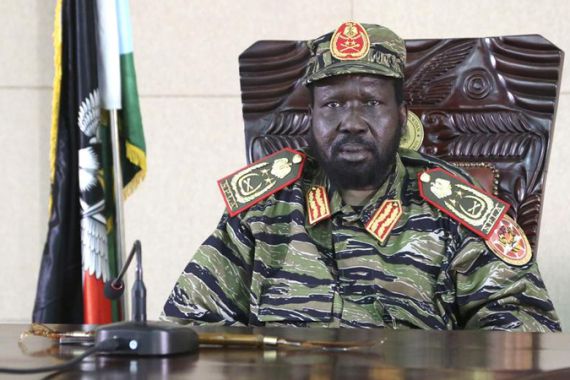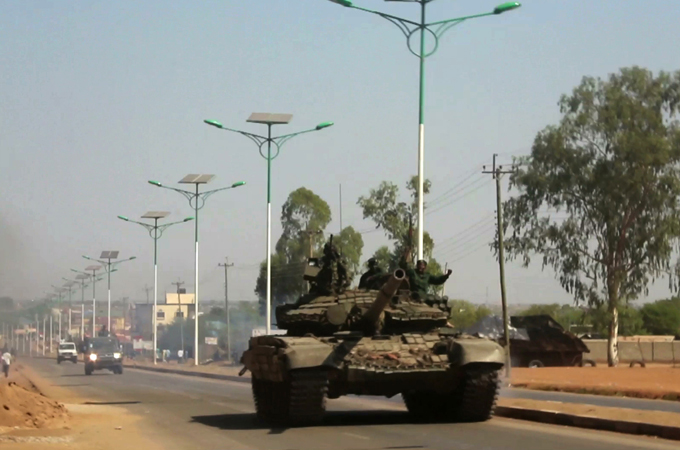Analysis: Struggle for power in South Sudan
Attempted coup underscores the country’s chronic political and economic problems.

When South Sudan seceded from the north to become an independent nation in 2011, the former deputy culture minister aptly described his new country as an injured creature unable to walk.
“Our country, as it stands today, is a four-legged animal but the legs are broken,” Jok Madut Jok said in a documentary aired by Al Jazeera.
“The first leg for any government is a disciplined military. We have problems with the way our military functions today. That’s a broken leg. We have civil society, right now it is very weak. The third leg is delivery of services. It is hard to deliver security …The fourth leg is political unity. We had political unity in the days leading up to the referendum [which led to independence]. Since the referendum, we have been having difficulties uniting our ranks. So right now the animal is standing on four crooked legs. If we do not fix these legs, the future is going to be very, very difficult.”
That grim assessment was accentuated by the revelation this week that President Salva Kiir had foiled a coup orchestrated by a disgruntled faction in the army, which backs former vice president Riek Machar. Machar was sacked in July when the president dismissed his entire cabinet.
Fighting has continued to rage in the eastern parts of the country. More than 500 people have been killed since violence erupted on December 15, according to officials. Thousands of people have been sheltering in United Nations buildings in Juba after fleeing their homes.
Many observers had predicted that Kiir was always going to have a hard time running the country after falling out with Machar. Both men are former rebel fighters and senior figures in the governing Sudan People’s Liberation Movement, which led South Sudan to independence after a civil war with Sudan that lasted 22 years. Earlier this month, Machar denounced “dictatorial” behaviour by Kiir, revealing the bitter divisions within the SPLM.
According to a statement the president released a day after the attempted coup, the coup plotters swung into action after an SPLM meeting in Juba. An unidentified person fired in the air and escaped, the statement said. That incident was followed later by an attack on the army headquarters near Juba University.
SPLM fragmentation
The SPLM is fully committed to the peaceful and democratic transfer of power and will never allow political power to be transferred through violence.
Kiir says the government is in “full control of the security situation”, but the fact authorities moved swiftly to impose a dusk-to-dawn curfew means the coup plotters have caused real panic. Significantly, the president – who often wears suits complete with his trademark wide-brimmed, black cowboy hat – addressed the nation in full military uniform, underlining the gravity of the problem he is dealing with.
“Your government led by the SPLM has articulated the ideals of democracy in the party as well as in the government, and I will never deviate from them at any cost. The SPLM is fully committed to the peaceful and democratic transfer of power, and will never allow political power to be transferred through violence,” said Kiir.
But the president’s political opponents would beg to differ. South Sudan’s constitution, enacted by the ruling SPLM, gives the president wide-ranging powers, including sacking elected governors for the country’s 10 states. The president also has powers to choose his own members of parliament.
Healing divisions in the SPLM is not going to be easy. The Dinka, the largest and most powerful ethnic group of which Kiir belongs, have been accused by the Nuer, Machar’s tribe, of monopolising everything from politics to the army. Last February, the president ordered more than 100 army generals to retire in a bid to reorganise the military, but the move did not impress many.
“Kiir is being opposed by a group led by his former vice president who think he has diverted from the party vision,” said a South Sudan journalist, who declined to be named fearing reprisals.
The new crisis adds to a host of problems that South Sudan, the world’s newest country, is facing and has done little or nothing to solve them.
Widespread corruption
Corruption is widespread and reaches into ministerial levels. Last August, an investigation unearthed 11,000 fake names on the police payroll, with another 16,000 considered suspect, putting half the force in doubt. Allegations of corruption have raised questions on whether Kiir’s administration can ensure accountability when it comes to public spending.
 |
| A tank patrols the South Sudanese capital Juba [Reuters] |
Despite high hopes that secession was going to provide a chance for lasting peace, South Sudan continues to reel from violence.
The country is awash with automatic weapons, many in the hands of civilians and security forces accused of poor discipline.
Last October, rebels killed at least 41 people and wounded scores in a gun attack in a remote part of the country’s restive Jonglei state. The rebels are loyal to militia leader David Yau Yau, a former colonel in South Sudan’s military.
Yau first rebelled against Juba after he failed to win a parliamentary seat in the last elections, accusing the ruling party of rigging the vote.
South Sudan has also yet to mend relations with Sudan, which it accuses of backing Yau. Yet it needs Sudan’s oil pipelines to transport its crude oil, the only thing that brings big money to its coffers. The two nations have also bickered about rebel activity in Blue Nile and South Kordofan states, with Sudan accusing its southern neighbour of backing the rebels there.
The Abyei question
But the real fight lies with Abyei, an oil rich enclave that straddles the border between South Sudan and Sudan and is claimed by both countries. A referendum to decide which country its inhabitants belong to was shelved amid disagreements.
In October the Dinka, with close ties to South Sudan, voted in an unofficial referendum but the Arab Misseriya, who are close to Sudan and use Abyei to graze their cattle, did not take part. Both countries did not endorse the referendum, and the Abyei question remains unresolved.
For many South Sudanese who voted overwhelmingly in favour of independence, a bigger question is how their country, which fares poorly on the UN Human Development Index, can move on. And many would agree with former minister Jok Madut Jok that until the country’s wobbly legs are fixed, the future will be bleak.